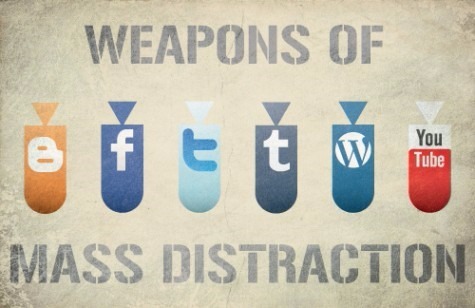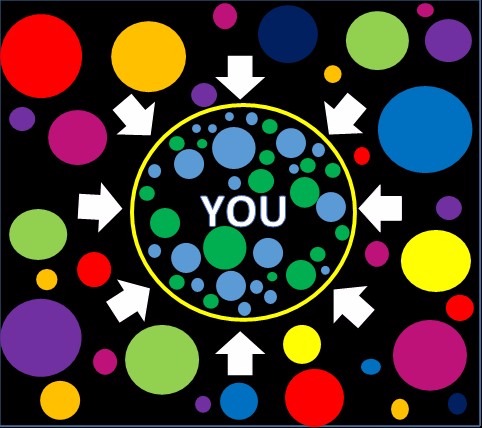 There is a lot of talk about distraction these days. The news is full of stories about the Trump administration and the President himself creating distractions to keep the public unfocused on issues they wish would go away (such as the Russias connections) and some people believe the President is too easily distracted by TV news and Twitter.
There is a lot of talk about distraction these days. The news is full of stories about the Trump administration and the President himself creating distractions to keep the public unfocused on issues they wish would go away (such as the Russias connections) and some people believe the President is too easily distracted by TV news and Twitter.
There are also news stories about the "distraction economy." So many people are vying for your attention. The average person today is exposed to 1,700 marketing messages during a 24-hour period. Most of these distractions are on screens - TV, computers and phones. Attention is the new currency of the digital economy.
Ironically, a few years ago I was reading about "second screens," behavioral targeting and social media marketing and that was being called the "attention economy." There is a battle for attention, and the enemy is distraction.
Google estimates that we spend 4.4 hours of our daily leisure time in front of screens. We are still using computers mostly for work/productivity and search. We use smartphones for connectivity and social interactions. Tablets are used more for entertainment. My wife and I are both guilty of "multi-screening." That means we are part of the 77% of consumers watching TV while on other devices. I am on my laptop writing and researching and she is on her tablet playing games and checking mail and messages. It is annoying. We know that.
Of course, the original land of distraction is the classroom. Students have always been distracted. Before the shiny object was a screen full of apps, passing notes was texting, and doodling in your notebook and the cute classmates sitting nearby were the social media. But I have seen four articles on The Chronicle website about "The Distracted Classroom" lately. Is distraction on the rise?
If you are a teacher or student, does your school or your own classroom have a policy on using laptops and phones? If yes, is it enforced? Anyone who has been in a classroom lately of grade 6 or higher knows that if students have phones or laptops out in class for any reason they are texting, surfing the web, or posting on social media.
Good teachers try to make classes as interactive as possible. We engage students in discussions, group work and active learning, but distractions are there.
Banning devices isn't a good solution. Things forbidden gain extra appeal.
 A few books I have read discuss the ways in which distraction can interfere with learning. In The Distracted Mind: Ancient Brains in a High-Tech World , the authors say that distraction occurs when we are pursuing a goal that really matters and something blocks our efforts to achieve it. Written by a neuroscientist, Adam Gazzaley, and a psychologist, Larry D. Rosen, they join other researchers who report that our brains aren't built for multitasking. This compares to a time a few decades ago when being able to multitask was consider a positive skill.
A few books I have read discuss the ways in which distraction can interfere with learning. In The Distracted Mind: Ancient Brains in a High-Tech World , the authors say that distraction occurs when we are pursuing a goal that really matters and something blocks our efforts to achieve it. Written by a neuroscientist, Adam Gazzaley, and a psychologist, Larry D. Rosen, they join other researchers who report that our brains aren't built for multitasking. This compares to a time a few decades ago when being able to multitask was consider a positive skill.
It seems that the current belief is that we don't really multitask. We switch rapidly between tasks. Any distractions and interruptions, including the technology-related ones - act as "interference" to our goal-setting abilities.
But is this a new problem or has our brain always worked this way? Is the problem really more about the number of possible distractions and not our "rewired" brains?
Nicholas Carr sounded an alarm in 2011 with The Shallows: What the internet is doing to our brains, arguing that our growing exposure to online media means our brains need to make cognitive changes. The deeper intellectual processing of focused and critical thinking, gets pushed aside in favor of the faster processes like skimming and scanning.
Carr contends that the changes to the brain's "wiring" is real. Neural activity shifts from the hippocampus' deep thinking, to the prefrontal cortex where we are engaged in rapid, subconscious transactions. Substitute speed for accuracy. Prioritize impulsive decision-making over deliberate judgment.
In the book Why Don't Students Like School?: A Cognitive Scientist Answers Questions About How the Mind Works and What It Means for the Classroom the author asks questions such as Why Do Students Remember Everything That's on Television and Forget Everything I Say? and Why Is It So Hard for Students to Understand Abstract Ideas? and gives some science and suggestions as answers. But these are difficult questions and simple answers are incomplete answers in many cases.
Some teachers decide to use the tech that is being a distraction to gain attention. I had tried using a free polling service (Poll Everywhere) which allows students to respond/vote using their laptops or phones. You insert questions into your presentation software, and that allows you to track, analyze, and discuss the responses in real time. The problem for me is that all that needs to be pre-planned and is awkward to do on-the-fly, and I am very spontaneous in class with my questioning. Still, the idea of using the tech in class rather than banning it is something I generally accept. But that can't be done 100% of the time, so distracted use of the tech is still going to occur.
 And the final book on my distraction shelf is The Filter Bubble. The book looks at how personalization - being in our own bubble - hurts the Internet as an open platform for the spread of ideas. The filter bubble puts us in an isolated, echoing world. The author, Eli Pariser, subtitles the book "How the New Personalized Web Is Changing What We Read and How We Think." Pariser coined the term “filter bubble.” The term is another one that has come up o the news in talking about the rise of Donald Trump and the news bubble that we tend to live in, paying attention to a personalized feed of the news we agree with and filtering out the rest.
And the final book on my distraction shelf is The Filter Bubble. The book looks at how personalization - being in our own bubble - hurts the Internet as an open platform for the spread of ideas. The filter bubble puts us in an isolated, echoing world. The author, Eli Pariser, subtitles the book "How the New Personalized Web Is Changing What We Read and How We Think." Pariser coined the term “filter bubble.” The term is another one that has come up o the news in talking about the rise of Donald Trump and the news bubble that we tend to live in, paying attention to a personalized feed of the news we agree with and filtering out the rest.
Perhaps creating a filter bubble is our way of coping with the attention economy and a way to try to curate what information we have to deal with every day.
Then again, there were a number of things I could have done the past hour instead of writing this piece. I could have done work that I actually get paid to do. I could have done some work around my house. But I wrote this. Why?
Information overload and non-stop media is hurting my/our discipline for focus and self-control.
Michael Goldhaber defined the attention economy in this more economic way: "a system that revolves primarily around paying, receiving and seeking what is most intrinsically limited and not replaceable by anything else, namely the attention of other human beings.” In order for that economy to be profitable, we must be distracted. Our attention needs to be drawn away from the competition.
As a secondary school teacher for several decades, I saw the rise of ADHD. That was occurring before the Internet and lack of attention, impulsivity and boredom were all symptoms. It worsened after the Internet was widespread, but it was there before it and all the personal digital devices.
Back in 1971, Herbert A. Simon observed that “what information consumes is rather obvious: it consumes the attention of its recipients. Hence a wealth of information creates a poverty of attention, and a need to allocate that attention efficiently among the overabundance of information sources that might consume it.”
We are collectively wiser than ever before. We have the wisdom of the world in a handheld computer connected to almost everything. But it is so difficult to filter out the distractions and garbage that we don't have a lot of success translating information into knowledge. People used to say that finding out something on the Internet was like taking a sip from a fire hose. Search filtering has helped that, but so far the only filters for our individual brains are self-created and often inadequate.

 This phenomenon is sometimes called "summer melt."
This phenomenon is sometimes called "summer melt." There is a lot of talk about distraction these days. The news is full of stories about the Trump administration and the President himself creating distractions to keep the public unfocused on issues they wish would go away (such as the Russias connections) and some people believe the President is too easily distracted by TV news and Twitter.
There is a lot of talk about distraction these days. The news is full of stories about the Trump administration and the President himself creating distractions to keep the public unfocused on issues they wish would go away (such as the Russias connections) and some people believe the President is too easily distracted by TV news and Twitter. A few books I have read discuss the ways in which distraction can interfere with learning. In
A few books I have read discuss the ways in which distraction can interfere with learning. In And the final book on my distraction shelf is
And the final book on my distraction shelf is